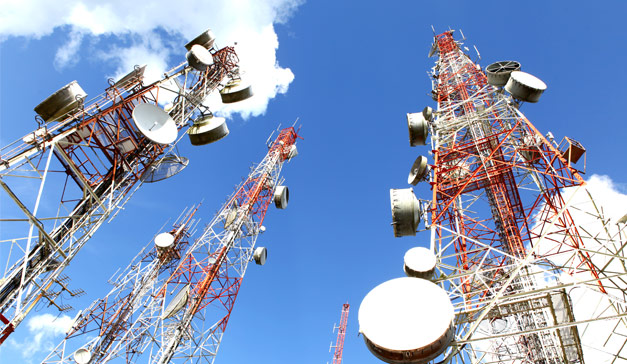Broadcasting
How desirable is 5% Excise Duty on Telecom Services?

By Ibrahim Dan Halilu
The Minister of Finance, Budget and National Planning, Mrs. Zainab Ahmed has thrown Nigeria into another controversy amidst plans to launch the 5G network, which is expected to transform every sector and sphere of life of the citizenry.

Coming at a time when Nigeria warming up to launch the largest high speed mobile network technology (5G) in Africa, the 5% excise duty on telecom services being implemented by the Federal Ministry of Finance and the Nigeria Customs Service, is not only a negation of the laudable gains of the Buhari administration in the telecom sector but another incontrovertible proof of the administration’s poor policy coordination.
The expectation of most Nigerians is that the Finance Minister and the Controller General of the Nigeria Customs Service who are the prime advocates of the 5% excise duty will engage with the Ministry of Communications and Digital Economy under whose purview the telecom sector presides, and the Nigerian Communications Commission (NCC) which is the telecom sector regulator, to create a synergy before rolling out the new tax regime.
It is no brainer to understand the imperative of engaging with these two government institutions whose role is central to all that the administration has achieved in that sector.
The NCC has over the years implemented various initiatives and programmes that have stabilized the telecom sector and created a very healthy environment for the industry to thrive and offer quality and affordable service to Nigerians.
The commission’s declaration of 2016 as the Year of the Telecom Consumers has placed premium on the consumer as king who should be treated with respect and offered value for money.
Conversely for the mobile network operators who enjoyed massive support of the Commission disputes resolution, protection of critical telecom infrastructures, and restoration of operational facilities that enhance better performance of the industry.
The Commission has played a very strategic role in resisting arbitrary hike in tariffs and other charges for telecom services which can impose additional burden on the consumers. Instead, the NCC envisions a new tariff regime that has not only reduced the cost of data by more than 100% but further increased access to telecom services in Nigeria.
Its robust National Broadband Policy 2020-2025 is aimed at achieving a new landmark in telecom operations in Nigeria as it rolls out the 5G technology that will change the way of doing almost everything.
Similarly, the Ministry of Communications and Digital Economy through its indefatigable minister, Prof. Isa Ali Pantami has launched Nigeria on the world map of countries that are transiting from analogue to digital economy with the unveiling of a robust policy on 5G Network and Digital Economy.
These are commendable efforts that should be complimented by the Federal Ministry of Finance and Nigeria Customs Service (NCS) through advocacy for a downward review or complete removal of some of the tariffs imposed on the MNOs and other service providers.
The presidential inauguration of a 27-person committee charged with the teak of exploring ways of improving Nigeria’s ranking on the Ease of Doing Business, should have been followed by an aggressive drive of the Federal Ministry of Finance to streamline some of the regulatory measures that hinder the effective performance of the industry such as multiple taxation, and promote policies that will remove barriers to consumer adoption of the new technology.
It is on this note that one wishes to appeal to the Minister of Finance to exercise the power conferred on her by the Finance Act 2020 with caution and empathy to the Nigerian consumers who are already overburdened by new series of taxes introduced by the Buhari Administration.
The Minster needs to find equilibrium between government’s desires to raise more funds and citizen’s expectations for better welfare as the destabilizing effects of the new tax regime outweigh its monetary benefits both to the economy and the citizens.
Firstly, the policy will reverse the gains recorded by the NCC in reducing the cost of telecom services to the consumer and efficient service by the Mobile Network operators (MNOs) who have to contend with multiple taxations and increased operation costs.
Secondly, the new policy may further have adverse effect on the flow of both foreign and local investment in the broadband infrastructure that is needed to scale up the deployment of 5G network to other cities across the country. The MNOs are already groaning under an indiscriminate multiple taxation policy that make is harming their business.
The greatest damage the new tariff will do to Nigeria’s telecom sector is derailing the rollout and total adoption of the 5G network that is being test run by the major telecom service network, the MTN whose competitor, Mafab has already announced an extension of the 5G launch to end of the year due to unforeseen challenges.
The Federal Government’s policy on 5G Spectrum for Digital Economy driven by the Ministry of Communication and Digital Economy may suffer a setback under the new harsh tax regime that targets the telecom sector as a major revenue earner for government.
The imposition of the 5% excise duty will be an additional burden on small businesses and individuals who wish to take advantage of the benefits and opportunities offered by the 5G network to expand and improve their businesses as they may face a new tariff regime.
Another possible consequence of the new tax regime is retarding the progress made in launching Nigeria into the open governance platform that promotes transparency and accountability, while enhancing citizens’ participation in governance as any increase in tariff will lead to low patronage of the telecom services.
It is my candid view therefore that the introduction of 5% excise duty on telecom services is both untimely and undesirable for Nigeria whose majority citizens are living below poverty margin, and have no visible source of income.
The Federal Ministry of Finance and the Nigeria Customs Service should dissipate more energy on initiating people-centred policies that will support the NCC in performing its regulatory functions instead of frustrating the laudable efforts of the commission to promote affordable and efficient telecom services in Nigeria.
The duo should regard themselves as a part of the same government that enunciated the policy of promoting digital economy through universal access to telecom services for Nigerians instead of a separate entity that competes for space or attention.
In her search for new avenues to improve government revenue, the Finance Minister should look beyond imposing excise duty on telecom services, and engage with the public and other stake holders to explore other options that are richly available.
The government can tilt the scale towards diversifying its revenue generation to imports for luxury items, luxury life-styles, and reducing the cost of governance at different levels. There are many wasteful spending that can be scaled down to save money for government to meet its financial obligations which is the main thrust of the Minster’s argument.
These include the purchase of exotic vehicles for public office holders, foreign travels, high duty allowances, and foreign trainings for public officials. Others are blocking the conduit pipes and confronting corruption head on.
These and many others will spare a huge sum that can be channeled to more productive projects that will impact on the lives of the people.
The rush to impose new tax regime on consumers of telecom services will be self-defeating, if at the end of the day the only benefit it accrues to the government is more money to spend instead of better welfare for citizens.
The telecom services are no longer a luxury but necessary tools that Nigerians need to connect with the rest of the word, share their ideas, knowledge, and information for a much better society.
The government should not shut out Nigerians or make it impossible for them to reach out to the rest of the world to market their skills, talents, and products in return for the much needed foreign exchange which is the essence of the digital economy which is the fulcrum of the administration’s |economic policy.
Nigerians deserve efficient and affordable telecom services to conduct their business activities on a global scale, which the controversial 5% excise duty seems to negate. It is a right, not privilege!
Ibrahim Dan Halilu is an Abuja based media consultant and communication expert. He can be reached via email at idhalilu@gmail.com or mobile 08101064449 9SMS only).
Broadcasting
Eedris Abdulkareem Teases New Protest Anthem following NBC Ban

Eedris Abdulkareem, veteran hip hop artiste, is showing no signs of backing down as he hints at releasing another protest song, shortly after his last track was banned by the National Broadcasting Commission (NBC).

Eedris Abdulkareem, veteran hip hop artiste
He recently again stirred the political waters as he hinted at the release of a new protest song, only weeks after his controversial track Tell Your Papa was banned by the National Broadcasting Commission.
The outspoken musician took to social media on Wednesday, April 16, 2025, to share an animated cover design with the words “3 Arms of Government,” suggesting the theme of his upcoming release.
Though the title remains undisclosed, the post was captioned simply with “Stay tuned,” fueling speculation that another hard-hitting social commentary is on the way.
Abdulkareem, known for his unapologetic political views, recently described the NBC’s decision to ban Tell Your Papa as hypocritical. Undeterred by censorship, he appears set to continue using music as a platform to criticize injustice and demand accountability.
The rapper also recently reaffirmed the relevance of his classic hit Jaga Jaga, stating that it would remain the country’s “second unofficial national anthem” until key issues like security, electricity, and governance are addressed.
With another protest song on the horizon, fans and critics alike are bracing for what may be Eedris Abdulkareem’s most direct political message yet.
Broadcasting
MultiChoice Brings Easter Home with Dedicated Pop-Up Channel

In celebration of the Easter season, MultiChoice has announced the launch of a dedicated Easter Pop-Up Channel, offering DStv and GOtv subscribers across Nigeria the chance to experience live broadcasts of key Easter events and services from the Catholic Archdiocese of Lagos.

The special channel, which runs from Thursday, April 17 to Monday, April 21, will be available on DStv channel 196 and GOtv channel 28, bringing the significance and beauty of Easter directly into viewers’ homes.
Throughout the Easter period, the channel will broadcast a rich lineup of live religious events. The programming begins on Thursday, April 17, with the Chrism Mass in the morning, followed by the Mass of the Last Supper in the evening.
On Good Friday, April 18, viewers can join in the Good Friday Tenebrae and the Seven Last Words service, followed by the Stations of the Cross from St. Gregory’s, and later the Passion Service.
The spiritual journey continues on Saturday, April 19, with the Easter Vigil Mass late in the evening, leading into the Easter Sunday Mass on April 20. The channel’s special programming concludes on Monday, April 21, with the Easter Monday Mass from Galilee.
This dedicated pop-up channel is designed for those who may be unable to attend church services in person, as well as for anyone seeking to deepen their spiritual observance during the Easter holidays. By broadcasting these significant events, MultiChoice reaffirms its commitment to providing content that resonates with the cultural and religious values of its viewers.
Subscribers are encouraged to tune in to DStv channel 196 and GOtv channel 28 throughout the Easter period to take part in these important religious celebrations from the comfort of their homes.
Broadcasting
Maximise Your Easter Getaway in Nigeria with Smart Travel Hacks

Easter is almost here, and with it comes the perfect opportunity to escape the everyday hustle and embark on a memorable adventure. Whether you’re craving some ‘chilling’ time, quality ‘family’ time, or a ‘pepper dem’ getaway, Nigeria offers endless possibilities for exploration. And the best part? Travelling locally has never been easier or more affordable.

Whether you’re a ‘newbie’ traveller or a seasoned pro, we’ve got you covered with essential hacks that will make your trip a breeze. Say goodbye to stress and hello to smooth sailing as you navigate your Easter getaway like a true travel expert.
Planning your trip is like packing your suitcase – essential, not optional
Just like you wouldn’t leave home without your power-bank (just in case!), don’t head off on a quick trip without a plan. A little prep can save you time, money, and stress — from booking flights and sorting transport, to packing light and right.
Nigeria has endless ways to travel. Flying with local airlines like Air Peace or Ibom Air is quick and budget-friendly, while renting a car gives you the freedom to explore scenic routes like the drive to Erin-Ijesha Waterfalls or the journey to Obudu Cattle Ranch. Not into driving? Buses like Peace Mass or God is Good are easy and affordable. And for a truly luxurious experience, you could even consider a chartered flight – if you’re balling!
Travel like a pro: The art of smart packing
Packing smartly is a crucial travel hack that can save both time and money. Amelia Campher recently shared on TikTok how she organised her hair, beauty, makeup, and personal accessories into different vanity cases and toiletry bags from Temu. Each one perfectly stores her daily essentials, keeping everything neat and accessible. She excitedly told her followers, “This is your sign to buy these bags!” Her clever packing strategy ensures that she’s ready for any trip without unnecessary clutter or stress.
Take Jasmin’s experience, for example. After getting hit with extra carry-on fees on a previous flight, she decided to be smarter about her upcoming family trip. In her search for a solution, she found the perfect backpack on Temu for just under ₦40k. Ticking all the boxes, it avoided extra carry-on fees and allowed her to efficiently pack 16 items plus a makeup bag. When they arrived at the airport, Jasmin’s family breezed through check-in with no issues, their backpacks meeting size requirements perfectly. No extra charges, no stress; just a smooth start to their unforgettable five-day family trip.
Backpacks aren’t just ideal for air travel – they’re also perfect for road trips. Whether you’re cramming your car with family and their belongings or flying high, packing smart and light is essential. A compact, well-organised backpack can make your journey easier, no matter the mode of transport.
To avoid unexpected charges when flying within Nigeria this Easter, it’s crucial to familiarise yourself with airline baggage policies; while Economy Class typically permits 15kg to 20kg of checked luggage, and Premium Economy or Business Class allows up to 30kg, always verify specific weight limits with your chosen airline to prevent costly excess baggage fees, especially if you plan on packing more than the standard allowance.
No passport needed: Pack your bags for a Naija Detty Easter
Why travel halfway across the world when Nigeria has it all? This Easter, skip the long-haul and discover the treasures on your doorstep. From the buzzing streets of Lagos to the ancient city of Benin and the serene hills of Jos, unforgettable adventures are just a short trip away.
By travelling locally, you’re not only creating new memories — you’re also supporting local tourism and helping grow our economy. With so many destinations to explore, there’s something for every kind of traveller. So pack your bags, plan smartly, and make this Easter your best Naija Detty holiday yet.

 Telecom2 days ago
Telecom2 days agoSalesforce Revolutionizes Business Intelligence with AI-Powered Tableau Next

 Broadcasting2 days ago
Broadcasting2 days agoMultiChoice Brings Easter Home with Dedicated Pop-Up Channel

 News2 days ago
News2 days agoAirtel Smartcash Set to Power Stress-Free Easter with Seamless Cashflow

 E-Business2 days ago
E-Business2 days agoDG NITDA Tasks Africa to Lead the AI Revolution Through Strategic Leadership, Inclusive Innovation

 E-Business2 days ago
E-Business2 days agoGoogle Blocks 5.1Bn Harmful Ads in 2024, Suspends 39m Accounts

 E-Financial2 days ago
E-Financial2 days agoHow CBEX Operators ‘Enticed’ Victims –SEC

 Telecom2 days ago
Telecom2 days agoTemu and Shein Raise U.S. Prices Amid Trump-Era Tariffs

 Broadcasting2 days ago
Broadcasting2 days agoEedris Abdulkareem Teases New Protest Anthem following NBC Ban

























